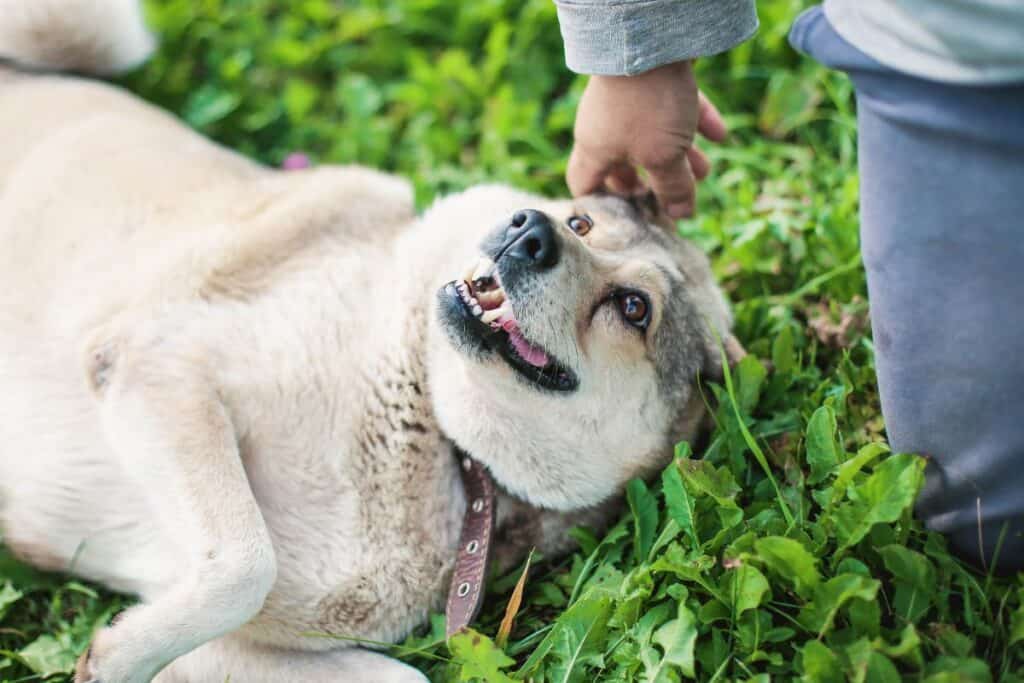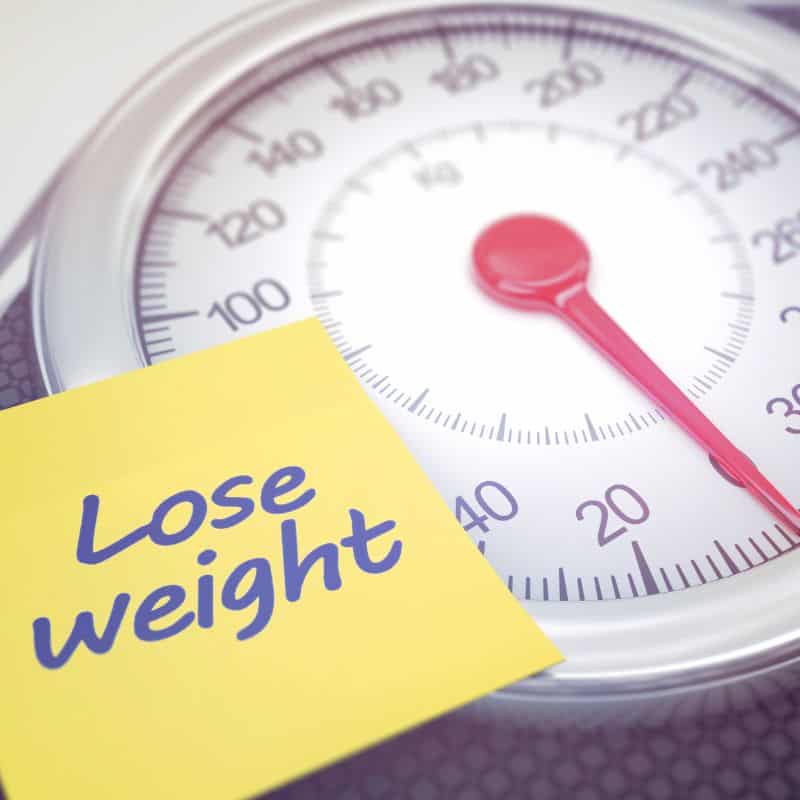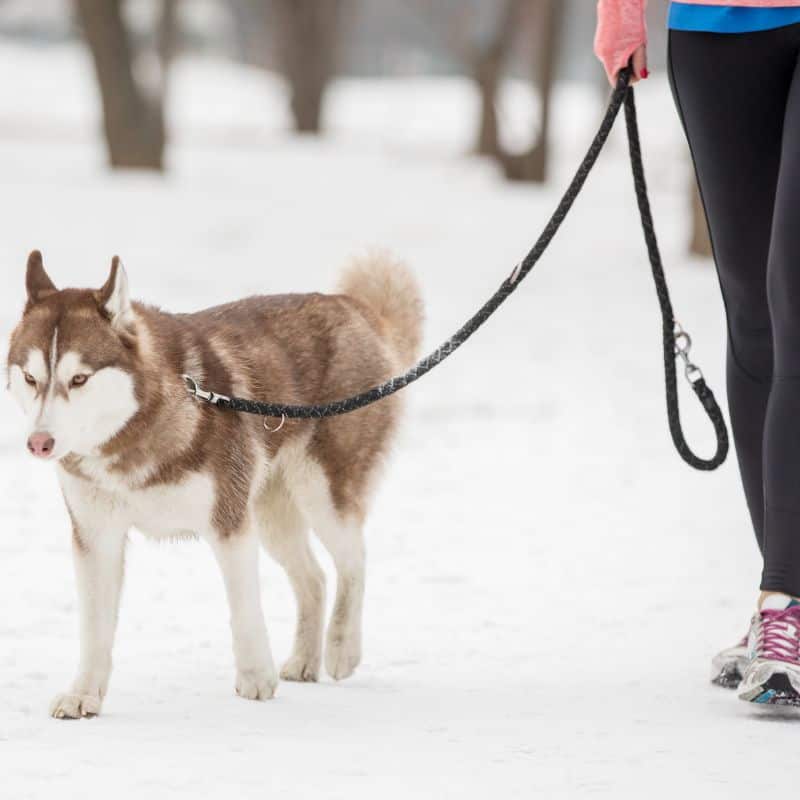Huskies are known to be one of the most energetic dog breeds. But huskies who pick up too much weight can become lethargic and develop health problems as they age. So, how much is too much, and is your husky overweight?
If your full-grown male husky weighs more than 61 pounds (27.5 kg) or your full-grown female husky weighs more than 51 pounds (23 kg), they are overweight. Other signs include not feeling your dog’s ribs if you run your hands on its sides or having a larger waist than its chest. The maximum weight varies according to breed, age, and height.
There are more details to consider when determining whether your husky is overweight, regarding breed, height, and age. Let’s dive into those in more detail.

How to Tell if Your Husky Is Overweight?
The best method is measuring your husky’s weight with a calibrated scale. You can do it at home using your regular weighing scale or take him to a vet for a more reliable answer.
The vet will tell you your dog’s weight and explain if it is ideal.
But, if you are doing it on your own, the table below has a breakdown of the different weight ranges for male and female Huskies at different ages.
| Age | Male Weight | Female Weight |
|---|---|---|
| Six-Month-Old | 33-43 lb (15-19.5 kg) | 26-36 lb (11.5-16 kg) |
| One-Year-Old | 43-57 lb (19.5-25 kg) | 34-49 lb (15.5-22 kg) |
| Two-Year-Old | 45-61 lb (20-27.5 kg) | 35-51 lb (16-23 kg) |
These weight ranges are for Siberian Huskies, the most popular of the husky dogs.
If you do not have a scale or have trouble making your dog stay calm during the process, you can use some sight tests to deduce if your husky is overweight.
- If you cannot see your dog’s waistline, then he is obese.
- Run your hands through the sides of your husky; if you cannot easily feel your husky’s ribs, then it is overweight.
- Look straight down at your husky from the top. He is probably overweight if his waist is more prominent than his chest.
These measures are most accurate for a medium to large husky such as the Siberian Husky or the Alaskan Malamute.
If you feel unsure about your husky’s weight, it is recommended to go to a vet for a professional opinion.
How to Reduce Your Husky’s Weight
Your husky is overweight; what can you do to control the situation?
Spoiler: you have to take the same route that you would if you were overweight. Diet and exercise are vital aspects of maintaining the weight of your husky.

1. Exercise
A husky is a very active dog; they are meant to exercise for at least 30-45 minutes daily.
If your husky is overweight, you will need to increase the exercise’s duration and intensity to allow it to shed its excess pounds. Aim for 60 minutes of daily exercise to lower weight and get your dog energetic again.
If you can’t find time in your daily routine to take your husky out for an hour for a jog every day, some alternatives include taking your dog out with you to run errands or letting them walk loose in your backyard.
Treadmill owners can get another use for their machines by letting their huskies walk on them under supervision.
If all else fails, you can hire a dog walker to ensure your husky gets the necessary exercise.
Nutrition
To manage the weight of your husky, you need to control its diet. You need to make sure not to over or underfeed your dog and that the food it eats fulfills all dietary requirements.
On average, your medium to large-sized husky should consume 1100 calories daily, depending on its size.
Smaller Husky breeds, such as the Pomeranian husky (a.k.a. Pomsky), require only 690 calories in comparison.
On average, your husky’s diet should consist of protein, wet or dry packaged food, and vegetables.
You can choose between these food items, but a husky does require more protein to keep up with their active lifestyle.
Feed your husky twice a day, once in the morning and once at night, and feed your husky two to three cups of food per day.
Puppies should be fed thrice daily. If you provide your husky with more than the required calories or nutrition, reduce the quantity of food and replace it with more nutrient-rich food.
You can do so by substituting dry kibble for a raw organic diet of meat and vegetables; this will keep your husky full and healthy for longer.
Reduce the number of treats and table scraps you give your husky. What seems like a tiny spoon of peanut butter is 96 calories added to your dog’s diet. In general, Huskies require less food than their size, but under or over-feeding them is harmful.
Once you have made the necessary adjustments to your husky’s diet and their weight begins to fall, you must maintain this feeding schedule and keep a close eye on their weight to ensure it does not increase or decrease further.
If you have ever had to lose weight, you’ll know that maintaining the weight after can be the real challenge.
Talk to a vet or professional breeder before drastically changing your husky’s diet.
Risks of Poor Weight Management
If you cannot control your huskies’ weight, the risk of several health issues will increase.
An overweight husky is more prone to heart disease, arthritis, skin diseases, and cancer. These diseases can be fatal for your husky if left untreated and can drastically reduce its lifespan.
Obesity also leads to joint issues as their weight is too much for their joints to support, which does not allow your husky to lead the active life it deserves.
It also increases stomach and urinary issues and can make everyday activities painful.
Additionally, when your husky is overweight, they can’t be as active as they wish; they may become lazy and less playful. Obesity can take up to 2 years off the life of your husky.
Final Thoughts On Obesity In Huskies
By understanding your husky might need help, you have taken the first crucial step towards improving the quality of its life.
Untreated obesity is a very common issue in dogs of any breed, but its impact on their health is long-lasting and severe.
Adjusting the diet and exercise of your husky is vital in ensuring your husky lives a long, happy and healthy life.

FAQs
What Is the Best Form of Protein You Can Give Your Husky?
The best protein you can give your husky must be a digestible and usable protein. Foods such as eggs, fish, and fresh meat are great to give your husky maximum protein with small serving sizes.
What Happens if Your Husky Does Not Exercise?
If your husky does not get the recommended amount of exercise, it will gain a lot of weight which will cause health issues. They will also have no release for their energy, making them frustrated; this may lead to poor behavior.
Why Doesn’t My Husky Finish His Food?
Huskies do not eat like other dogs. In most cases, they only eat til they are full. Even if you put two servings in front of your husky, they will only eat one. If you feel your husky is eating less than the required amount, you can try new and different foods; they might enjoy them more.



